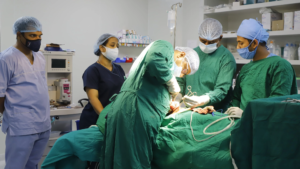Stem cells are the components present in your body, which bring forth all other specialized cells such as blood cells, brain cells, heart muscle cells or bone cells. No other cell in the body has the regenerating ability as stem cells. The most known types of blood cells being
- White Blood cells – Which fight infection
- Red Blood cells – Which transport oxygen throughout your body
- Platelets – Which help the blood clot and prevent bleeding to death.
All the above cells are required to maintain a healthy body
What is a Stem Cell Transplant
Stem cell transplant is the clinical process of obtaining healthy blood-forming stem cells, procured either from your own body or from some other person’s, in order to replace the lost stem cells in your body. The stem cells are derived from the donor’s bloodstream, bone marrow or the umbilical cord. Stem cells are introduced into your bloodstream using a needle. Once in your blood, they have to travel to the bone marrow where they fill the void created by the lost cells.
When is a Stem Cell Transplant Recommended
A stem cell transplant is done when:
- Your bone marrow or stem cells have failed to create any more blood cells.
- Your bone marrow or blood cells have become infected.
- You have a disease such as ‘cancer’ which can only be cured with high doses of chemotherapy and/or radiation treatment, which destroys both, cancer and your stem cells.
Before you go for a treatment, it is highly advised to consult your family doctor or a medical expert. If you are looking for a cancer specialist in Pune, Mumbai, Satara, then visit Onco-Life Cancer Centre – A state of art Super Specialty Cancer Hospital with second NABH Accreditation.
Stem cell transplants play a significant role in fighting against certain blood cancers, such as multiple myeloma, non-Hodgkin’s lymphoma, Hodgkin lymphoma, and leukemia. A stem cell transplant may add years to your life and in some cases, even cure blood cancers.
How Stem Cell Therapy Works
Stem Cells present in the bone marrow produce blood cells such as the White blood cells, Red blood cells and also the platelets. Cancer cells feed on your bone marrow and damage it. Ironically, the chemotherapy and radiation treatment, which is used to kill the cancerous cells, also ends up destroying the stem cells present in the bone marrow. A stem cell transplant recovers the damage, by planting new, cancer free and healthy cells, in place of destroyed ones to let them reproduce further.
Note that these stem cells may be derived from your own blood where cancer has not yet reached or from another person – a donor who needs to match your blood type.
What to Expect Before the Stem Cell Transplant
- The patient or the donor will be administered special injections four or five days before drawing the blood. These injections will lodge the blood-forming stem cells from the bone marrow into the bloodstream in order to enable extraction of stem cells via the blood.
- Once extracted, the stem cells will be frozen to keep them preserved
- The patient will then undergo a conditioning treatment which is a high or low dose chemotherapy/radiation therapy which indiscriminately kills all the cells including cancer and stem cells. Onco-Life Cancer Center has an expert team of radiation oncologist in Pune, Mumbai, Satara region at your service.
What to Expect During the Stem Cell Transplant
- The patient will be required to remain seated on a chair for several hours as the process of infusion of new stem cells take place
- The infusion is done using a surgical port in the patient’s neck called the central line
- The patient will be under observation and will be monitored for any indications of fever, chills, hives or a drop in blood pressure.
- Mild side effects such as headache, nausea, and shortness of breath are common.
What to Expect After the Stem Cell Transplant
- After two to four weeks, the new stem cells graft to the bone marrow and first starts manufacturing new white blood cells, followed by platelets, then red blood cells.
- In the case of donor blood cells, antibiotics will be provided for the body to accept the new cells without rejection
- The patient will be required to stay hospitalized in a clean place and under observation for a month in order to avoid any external infection. Visitors will be asked to wear masks.
About two months post the transplant, the doctor may take a sample of bone marrow from the patient’s hip to check the production of all types of blood cells.
Before you undergo the treatment, consult with your doctor to know the possibilities. Visit Onco-life, a highly trusted name for cancer treatment in Pune, Mumbai, Satara, and entire Western Maharashtra.





